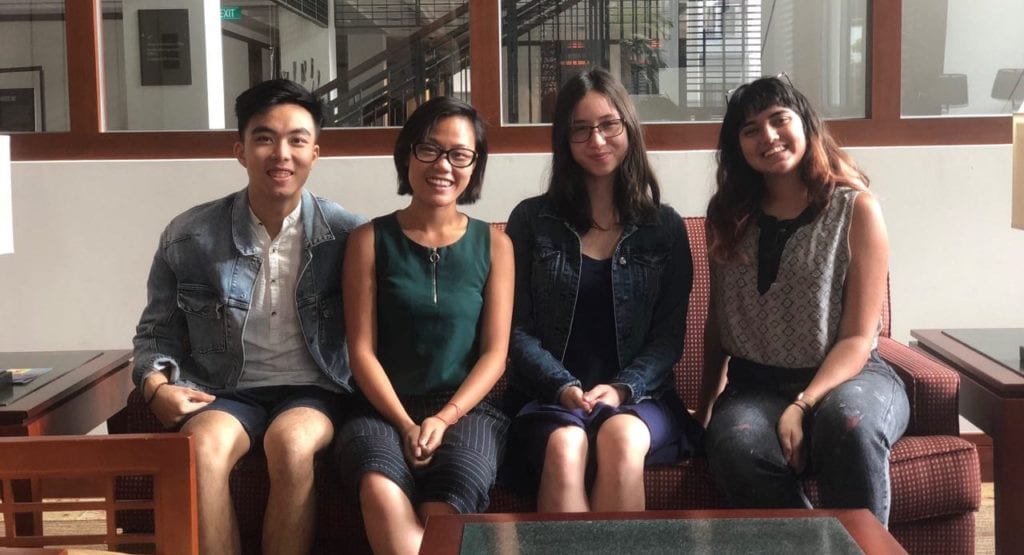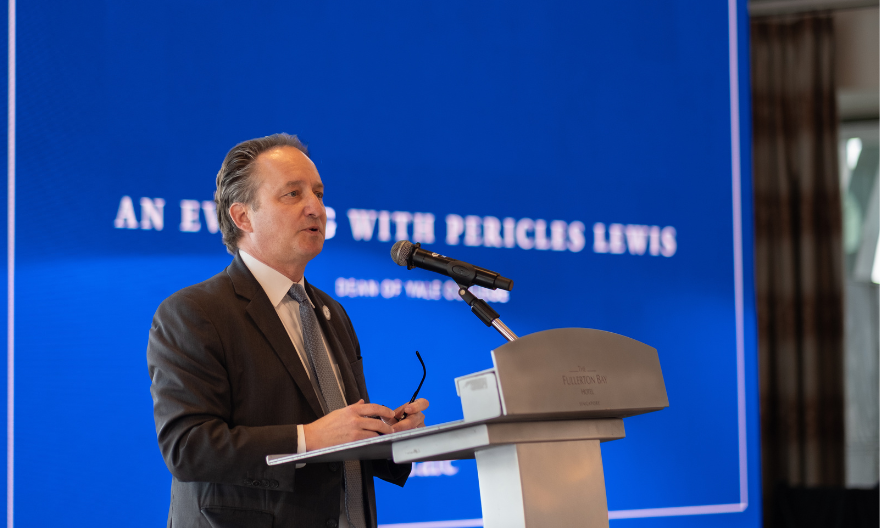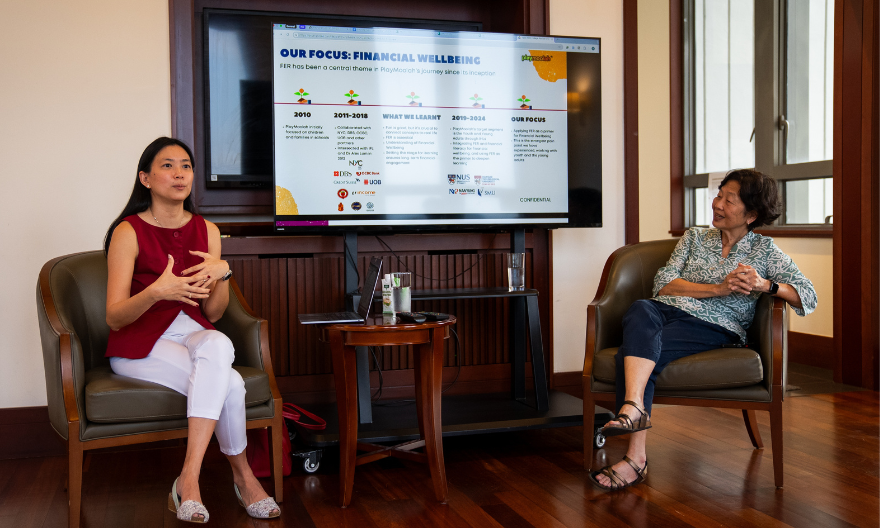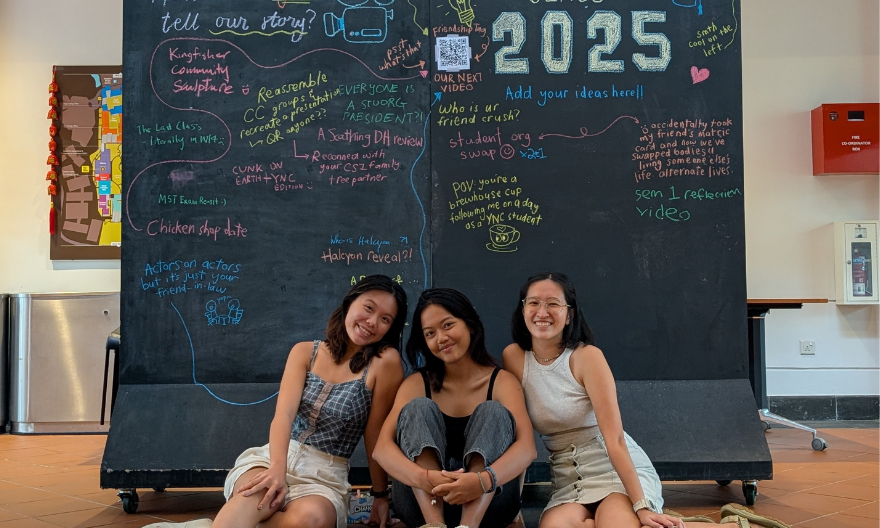Yale-NUS students win first place in the Cities and Refugees Competition
A project by a Yale-NUS College team on improving the lives of refugees in Malaysia has won first place in a global student design ideas competition hosted by the University of New South Wales (UNSW), with Australian Red Cross, ARUP International Development, United Nations High Commissioner for Refugees (UNHCR) and the Association of Pacific Rim Universities – Sustainable Landscapes and Cities Hub (APRU SCL).
 From left: Ernest Tan, Ly Nguyen, Lucy Davis and Sharan Sambhi. Image provided by Lucy Davis.
From left: Ernest Tan, Ly Nguyen, Lucy Davis and Sharan Sambhi. Image provided by Lucy Davis.
The team, comprising Lucy Davis (Class of 2020), Sharan Sambhi (Class of 2021), Mr Ernest Tan (Class of 2019) and Ms Ly Nguyen (Class of 2019), emerged winner in the ‘Cities and Refugees’ competition from among 28 teams from 15 countries. The results were announced at the APRU Sustainable Cities and Landscapes conference held at UNSW (Sydney) from 29 August to 1 September 2019.
In their winning entry, the team came up with a three-part solution. First, they planned a pop-up clinic run by university students within a refugee education centre and sponsored by the Taiwan Buddhist Tzu Chi Foundation. Second, they strived to design a community garden operated by refugees as the majority of Rohingya refugees are farmers. Lastly, the students proposed a pedestrian bridge that would connect the pop-up clinic, community garden and social spaces like coffee shops and market stalls.
Explaining their solution, Ms Nguyen said the clinic would ensure that refugees have access to safe healthcare and offer doctors a chance to meet the refugee community and build compassion towards them, while the garden will allow the refugees to make a living while at the same time be active contributors to the city. The students also discovered that job matching happens mostly at the Malaysian coffee shops and market stalls because they are the most vibrant social spaces. This is another way of contributing to refugees’ social integration and economic prosperity. Hence, they proposed to build a pedestrian bridge that would connect the three interventions both spatially and thematically.
“This way, we hope to physically and conceptually illustrate the ‘bridging’ of refugees and locals,” said Ms Nguyen.
According to the students, the design aims to first, ameliorate the physical, mental and economic livelihood of Rohingya refugees living in Kuala Lumpur and second, help integrate them into the Malaysian host community.
“What is being done on the ground in Malaysia to help refugees are efforts headed by refugees themselves,” said Ms Nguyen. This realisation inspired the team to focus on solutions that would give refugees agency to help themselves. “Because they are capable of doing so if they are given support and compassion,” she added.
Sharan and Lucy was inspired to take part in the competition to design a physical intervention that meaningfully improves the lives of refugees in the city after attending a Learning Across Boundaries (LAB) programme titled ‘Public Health and Refugees in Transition’ in Kuala Lumpur, Malaysia in May 2019. LABs are faculty-generated initiatives of a short duration that allow faculty to share their scholarship with students outside of the classroom and create an opportunity for students to explore themes of the curriculum in a broader context. The Public Health LAB was conducted by Dr Kaveh Khoshnood (Yale School of Public Health) and Dr Veena Pillai (Dhi Consulting & Training, KL), and organised in collaboration with the Centre for International & Professional Experience (CIPE).
In Kuala Lumpur, the students had the opportunity to learn about the public health challenges faced by refugees and health professionals there, and visited UNHCR, refugee health clinics and refugee community-based organisations. Sharan and Lucy also got to witness the dire conditions Rohingyas experience first-hand during the LAB.
Hoping to put what she has learned into practice and to make a difference in the plight of the refugees, Sharan decided to work on a project that draws on the narratives and connections they had built in Kuala Lumpur.
“We adapted what we learned during the LAB to design an urban intervention that would meaningfully improve the lives of Rohingya in Kuala Lumpur,” said Lucy.
Ms Nguyen credited the Urban Studies major at Yale-NUS for providing her with the frame of reference for the urban solution ideas as well as an urge to be involved in the issues related to the city. She cited the International Immigration course taught by Associate Professor of Social Sciences (Sociology and Public Policy) Anju Paul for establishing a sense of responsibility in her, and inspire her to “improve the lives of all inhabitants in the city, regardless of where they come from, and especially if they are running from persecution”.
Ms Nguyen believes that her group’s success in this project stemmed largely from the nature of the liberal arts education offered by Yale-NUS College.
“Although some of us may lack the technical skills of students in specialised courses, our critical thinking skills, ability to connect and synthesise ideas, and research-driven approach have helped us produce an in-depth and thoughtful solution that have been recognised (at this competition)”.




